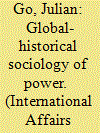|
|
|
Sort Order |
|
|
|
Items / Page
|
|
|
|
|
|
|
| Srl | Item |
| 1 |
ID:
124763


|
|
|
|
|
| Publication |
2013.
|
| Summary/Abstract |
Michael Mann's long-anticipated volumes, the sources of social power, volume 3: global empires and revolution, 1890-1945 and the sources of social power, volume 4: globalizations, 1945-2011 complete Mann's career-spanning project. Compared to previous volumes in the series, these works are much more global in scope. They address topics such as global wars, empires, social citizenship across the industrialized world, economic recessions and climate change. In this way they rectify omissions in Mann's previous work, even while continuing to deploy Mann's previous IEMP (ideological, economic, social, political) model of power. However, three shortcomings remain: first, the books do not adequately deploy the concept of society as power networks; second, they do not offer a conceptualization of global systems or dynamics beyond the sum total of actions by individual states or actors; and third, they retain the standpoint of power in their analyses. Despite these shortcomings, these volumes offer a masterful global history of power over the past century and a half and make long-lasting contributions to the historical sociology of power.
|
|
|
|
|
|
|
|
|
|
|
|
|
|
|
|
| 2 |
ID:
167057


|
|
|
|
|
| Summary/Abstract |
This article opens a dialogue between different notions of conflict and the sociology of power and suggests a new theoretical framework for the analysis of international conflicts. Refusing to consider abstract entities as actors, it helps us better determine who the relevant actors are in each international conflict and gives special attention to the existing power relations between them. Accordingly, it is considered that a large social system is made up of numerous actors with multiple conflicts between them. Thus, in the case of international conflicts, we do not face one single conflict, but a conflictual complex involving a multitude of actors with their different power resources, who weave a network of conflicts and power relations between them, and at its top a dominant conflict, the conflict around which the other conflicts evolve. Acknowledging the complexity of international conflicts, this new theoretical approach should better explain both the behaviour of the actors and the evolution of the conflictual complex itself.
|
|
|
|
|
|
|
|
|
|
|
|
|
|
|
|
|
|
|
|
|